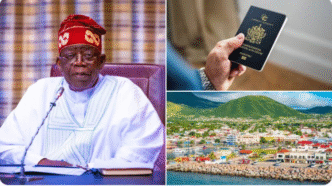In a historic diplomatic move, Nigeria has officially granted visa-free entry to citizens of St. Kitts and Nevis, effective September 26, 2025. This marks the first time Nigeria is extending such a privilege beyond the African continent, signaling a bold step towards strengthening Afro-Caribbean ties.
The waiver applies to holders of ordinary, official, and diplomatic passports, ensuring that citizens of St. Kitts and Nevis can now enter Nigeria without prior visa arrangements. Until this development, Nigeria’s visa-free policy was largely limited to citizens of the Economic Community of West African States (ECOWAS), with Cameroon and Chad being the only non-ECOWAS African countries to enjoy such access.
The landmark decision is expected to boost trade, investment, and cultural exchanges between the two nations. Experts see it as a strategic policy shift designed not only to deepen Nigeria’s global partnerships but also to affirm its leadership role in promoting Afro-Caribbean cooperation.
A Milestone in Nigeria’s Diplomatic History
The inclusion of St. Kitts and Nevis in Nigeria’s visa-free framework is unprecedented. For decades, Nigeria’s foreign policy has placed emphasis on regional integration within Africa, particularly through ECOWAS. This move, however, represents a deliberate extension of Nigeria’s influence beyond continental borders, tapping into the growing potential of Afro-Caribbean relations.
Diplomatic analysts believe the decision is also a reflection of Nigeria’s recognition of the Caribbean as a vital partner in fostering South-South cooperation. The Caribbean, with its growing investment links to Africa, represents fertile ground for collaboration in areas such as tourism, trade, education, and technology.
By removing visa barriers, Nigeria has sent a strong message that it is open for business and cultural partnerships. It also sets a precedent that could encourage similar agreements with other Caribbean states in the near future.
Afri-Caribbean Investment Summit: The Catalyst
The visa-free agreement can be traced back to the Afri-Caribbean Investment Summit (AACIS ’25), held in Abuja earlier this year. The event, organised by Aquarian Consult Limited (ACL), provided a platform for stakeholders from Africa and the Caribbean to explore opportunities for collaboration.
During the summit, discussions centered on the need to move beyond rhetoric and establish concrete policies that facilitate people-to-people connections and business engagements. The visa waiver is now being celebrated as a tangible outcome of those deliberations.
Aisha Maina, Managing Director of Aquarian Consult Limited, highlighted the significance of the achievement, saying:
“This visa waiver is more than diplomacy; it is about opening doors for trade, investment, and cultural exchange. At ACL, we are proud to have played a role in turning dialogue into action.”
Her remarks underscore the importance of private sector involvement in shaping government policy and bridging gaps between regions separated by geography but united by shared historical and cultural ties.
Economic and Trade Implications
The decision is expected to have far-reaching economic benefits for both Nigeria and St. Kitts and Nevis. Nigeria, Africa’s largest economy, has been working to diversify its international partnerships beyond traditional Western allies. Strengthening economic ties with Caribbean nations offers fresh avenues for investment, particularly in sectors such as tourism, agriculture, education, and digital technology.
For St. Kitts and Nevis, the visa-free access opens doors for entrepreneurs, investors, and tourists to engage with Nigeria’s large market of over 200 million people. The country, which has positioned itself as an attractive destination for international investment through its citizenship-by-investment program, can leverage this policy shift to foster bilateral trade and joint ventures.
In the long term, this policy could also encourage Nigerian businesses to explore investment opportunities in the Caribbean, creating a two-way trade corridor that expands beyond Africa’s borders.
Strengthening Cultural and Historical Ties
Beyond economics, the waiver acknowledges the deep cultural and historical connections between Africa and the Caribbean. Many Caribbean nations trace their roots to Africa, with cultural practices, music, religion, and traditions bearing clear African influence.
By opening its borders visa-free to St. Kitts and Nevis, Nigeria is not only acknowledging this shared heritage but also promoting cultural exchange as a bridge to strengthen ties. This is expected to encourage more cultural festivals, educational exchanges, and tourism initiatives that celebrate the Afro-Caribbean identity.
Observers note that such connections are vital in dismantling barriers created by centuries of geographical separation and colonial history. The waiver, therefore, is seen as a symbolic act of unity, affirming the importance of reconnecting African nations with their diaspora in the Caribbean.
Implications for Nigeria’s Foreign Policy
Nigeria’s foreign policy has historically emphasized African unity and cooperation, a principle that guided its leadership role in ECOWAS and the African Union. This policy shift suggests a broader vision—one that includes building bridges with diaspora communities and non-African partners with shared interests.
The decision also comes at a time when African nations are increasingly seeking to engage with the Caribbean through bilateral agreements, trade partnerships, and cultural initiatives. By taking the lead, Nigeria has positioned itself as a pioneer in Afro-Caribbean diplomacy, setting an example for other African countries to follow.
Furthermore, the move reflects Nigeria’s strategic interest in diversifying its diplomatic alliances, particularly as global politics evolve and the Global South emerges as a stronger force in shaping international relations.
Reactions and Expectations
The announcement has been met with positive reactions from both Nigerian and Caribbean stakeholders. Many have praised the move as progressive and timely, especially in light of increasing calls for stronger ties between Africa and its diaspora.
Business leaders are optimistic that the waiver will ease travel for investors and entrepreneurs, allowing for quicker deal-making and stronger partnerships. Cultural advocates, on the other hand, see the decision as a recognition of shared identity and a commitment to reconnecting broken ties.
While some critics caution that the policy should be carefully monitored to prevent abuse, most agree that the benefits outweigh the risks. Analysts also suggest that Nigeria should use this as a steppingstone to negotiate reciprocal arrangements, ensuring that Nigerian citizens also enjoy visa-free access to St. Kitts and Nevis.
Looking Ahead
The visa-free entry granted to citizens of St. Kitts and Nevis is a diplomatic breakthrough for Nigeria, one that could reshape its engagement with the world beyond Africa. By breaking new ground, Nigeria has shown readiness to embrace innovative policies that strengthen economic, cultural, and political ties.
Observers believe this could be the beginning of a wider Afro-Caribbean partnership, with Nigeria leading the way. If successfully implemented and expanded, such agreements could foster greater unity among nations that share common heritage, interests, and aspirations for development.
For now, the policy stands as a symbol of possibility—an open door to a future where Africa and the Caribbean collaborate more closely, bridging oceans to build lasting bonds of prosperity and solidarity.
As Aisha Maina of ACL put it, this is “more than diplomacy.” It is a bold step toward reimagining Nigeria’s place in the world and reaffirming its role as a leader in fostering global connections rooted in history, culture, and mutual progress.














